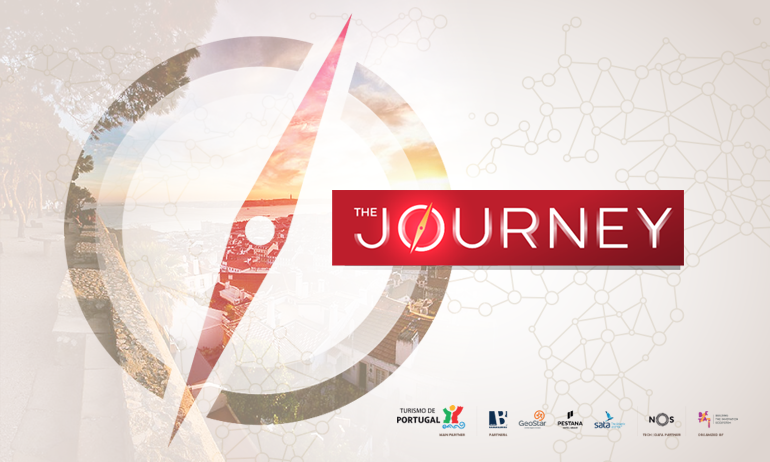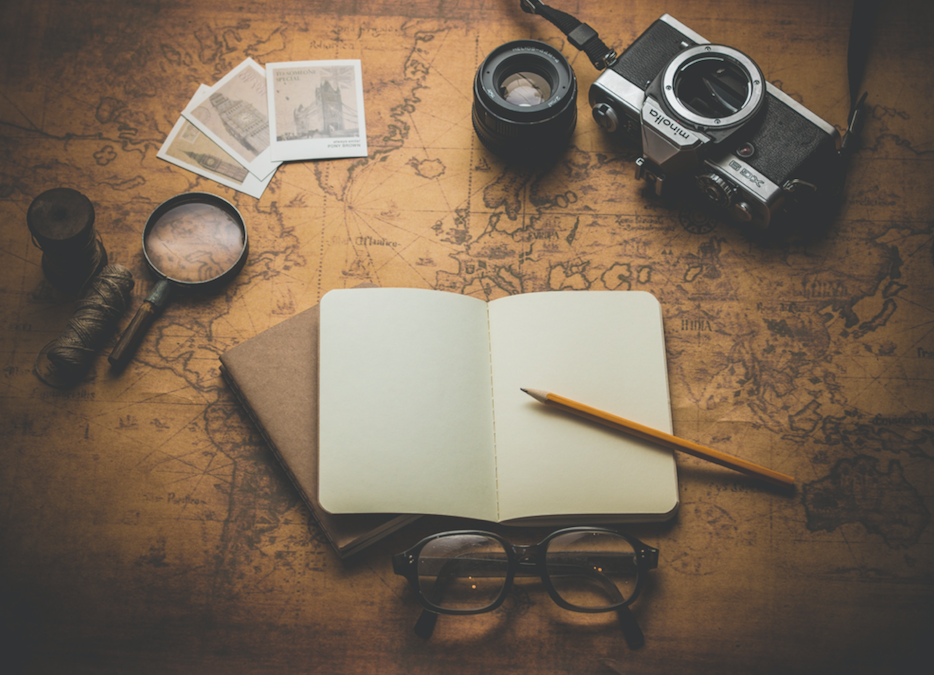
by Carolina Santos | May 9, 2018 | Startups
The second edition of The Journey, a 5-month program for startups to pilot innovative solutions that can be applied in addressing travel and tourism players challenges. started this week, with the support of Turismo de Portugal in partnership with Grupo Barraqueiro, Geostar, Pestana Hotel Group, SATA Azores Airlines and NOS.
The program is focusing on four different areas:
- Personalize the Customer Journey – Leveraging Big Data sources and use of Predictive Analytics (Artificial Intelligence, Machine Learning, and Natural Language Processing).
- Seamless Traveling Experience – Reducing points of friction (e.g. check-in) and the use of Blockchain for payments, loyalty, supply chain and contracts.
- Customer Care – Mobile strategy using multiplatform interactions to increase customer satisfaction and loyalty.
- Conscious Travel – Solutions to position The Journey partners as key actors for the sustainability of destinations.
According to Luís Araújo, President of Turismo de Portugal, “We want to turn Portugal into the center of innovation for tourism”. Pedro Rocha Vieira, Co-founder and CEO at Beta-i, says that “the tourism is one of the most important sectors in the Portuguese economy and the one that has been growing the most”, adding that “the goal is to achieve the 80 million stays a year until 2027, but for that to happen the industry has to be based on innovation processes”.
Applications are open until June 15, 2018, so if you have a solution regarding hospitality, travel (agency) services, tours & activities and air & ground transportation, go for it.

by amalienaustdal | Oct 10, 2017 | Corporates, Investors, Startups
Frank Borman, a retired NASA astronaut, once said: ‘exploration is really the essence of the human spirit’. Now, you don’t have to go all the way to space for exploration. There are plenty of wild and unexpected adventures made possible by a short flight. It seems like more and more people share the beliefs of Frank Borman. Nowadays, more people are traveling, going to far-away destinations, whilst seeking more immersive experiences.
More than ever, we are looking for ‘exploration’ and not just ‘holidays’. It is changing the face of the travel industry. New niches are being created, with new solutions entering the market. Three core themes driving the disruption of the industry are demand for sustainability, future traveler’s needs and innovation.
Sustainability
Not only have we become more aware of making our travels a lasting memory, we are also seeking to make a positive impact on the destination we travel to. The travel industry has become the largest industry worldwide, increasing our responsibility to protect and preserve the places we love to explore. Travelling is associated with a large carbon footprint and the derogation of natural and cultural heritage. As we are becoming more aware of this, travelers are starting to demand green and sustainable alternatives at every step of the journey. Now, 70% of travelers expect companies to demonstrate a commitment to preserve the natural environment. Many local and national economies rely on tourism, yet many are starting to realize the negative impact of tourism. Spain is a prime example of a country struggling with mass tourism. Forcing the nation to take constricted action to reduce the number of visitors in its most popular destinations. Thus, there are many changes being made in the industry; new regulations, innovative technologies and sustainable alternatives to combat the bad rep of traveling as an environmentally polluting activity.
The Future Traveler
Travel is about consuming experiences, and we all want a unique experience tailored to ourselves. Technology is making this possible. In turn, technology is making the needs of the future traveler more complex and higher than ever. We want more out of each experience. Each encounter on the travel needs to be unique, memorable, adventurous, effortless and personalized. The future traveler has technology at their fingertips, with access to personalized information, whenever, wherever. Before the trip, technology allows for a more seamless integration of planning tools for easy booking of hotels and add-ons tailored to your interests. During the trip, the connected traveler can easily navigate their way through the final destination and easily discover the offers around you. As a result of social media, the future traveler is seeking unique experiences, going off the trail for a killer image. It is no longer possible to satisfy the needs of the future traveler without innovating and offering tailored services to the individual.
Innovation
There are many technological innovations entering the tourism industry today. Crowdsourcing sites with reviews and advice make choosing restaurants and experiences easier. The sharing economy gives rise to new options in accommodation, such as Airbnb and Couchsurfing, as well as cheaper transportation and meal offers. Online platforms are making it easier to plan your holidays. Virtual reality is making it possible to experience your holidays before you go, to get a glimpse into what you can expect. Augmented reality can be your personal tour guide, tailoring the guide to your interests instead of a generic group tour. There are countless new innovations entering the market every day, improving our travel experience throughout the journey.
It is not a coincidence, that these three areas are in fact the three core themes covered for the Lisbon Tourism Summit. The Lisbon Tourism Summit is an event dedicated to the tourism industry; its innovators, challenges, and developments. Seeking to inspire, demonstrate new solutions and bring together key players in the industry.
As a final note, I will leave you with another quote. Some food for thought.
‘The traveler sees what he sees. The tourist sees what he has come to see” – Gilbert Chesterton.

by dboonstra | Dec 6, 2016 | Uncategorized
Last week, the muscle of the Tourism sector gathered at the school of Hospitality and Tourism in Lisbon. Representatives from Turismo de Portugal, TimeOut Market, Pestana Hotels & Resorts, and Beta-i (among others!) came together to talk about where the next disruption in the industry will come from and how Portugal can align itself to be responsive to changing tastes and need.
The key theme that emerged from the event was that although technology and innovation would be key tools to keep Portugal at the global forefront, it is necessary to stay focused on the needs of the consumer rather than just use technology for the sake of technology.
Carlos Abade, of Turismo de Portugal opened the event discussing how Turismo de Portugal has been supporting and responding to the needs of startups in Tourism. Technology is, of course, at the heart of this, which led to a discussion on Smart Destinations and the future of Lisbon in this field with representatives from NOS and Conteúdo Chave, among others on the panel.
“A smart destination is the one that exceeds expectations” Luís Barata from NOS
After a series of startup pitches, Tech strong-(wo)man and Cisco GM, Sofia Tenreiro, took the stage to talk about the rising expectations of tech within tourism. She proceeded to demonstrate this by making the necessary addition of wifi to Maslow’s hierarchy of needs.
At Beta-i, we can see the value added to a startup when it works with a larger corporate, it can help with marketplace validation, getting the first big client, scaling up, the list goes on and on. So this next panel brought together startups and Corporates to discuss on stage the benefits and risks of these partnerships.
The most tourist-y panel was next with Francisca Van Zeller, a wine producer from Quinta Vale D. Maria and Joana Cardoso from EGEAC, discussing marketing Portuguese Culture as a Product. Ana Alcobia, GM from Time Out Market, was able to add depth to this discussion in her keynote presentation as she told the story of the Time Out Market and the philosophy that guides the curation of the businesses there:
“The Time Out Market is made for locals and that’s why we have 70% of tourists coming there”.
Secretary of State for Tourism, Ana Mendes Godinho, ended the fall edition of Tourism Day 2016, with a round up of initiatives that her office is pursuing to support startups. There was overwhelming support shown to startups from all the government figures present and a sense that new disruptive technology would lead the way forward for the industry.

by maria | Jul 4, 2016 | Uncategorized
Another Tourism Day has come to an end and all I feel like is traveling (and getting lost again). But maybe this time, I’ll start in the beautiful Parques of Sintra and while I try to figure out my way back home I’ll just end up in Sagres at the Martinhal Family Hotels & Resorts (wishful thinking, I know).
It’s just that hearing all those interesting stories and meeting the ones behind some of the main companies and organisations in tourism really made me want to just pack my bags.
But, enough of me writing… Let’s get down to more important details.
Here are the main highlights of Tourism Day Summer 2016, organised by Beta-i, in partnership with Turismo de Portugal and hosted by Airbnb in Lisbon:
- Check out our video with the main highlights of the day
- See all the photos in our facebook album
- Read the impact study by Airbnb to analyse the results of Airbnb in Lisbon
See you in the next Tourism Day!




